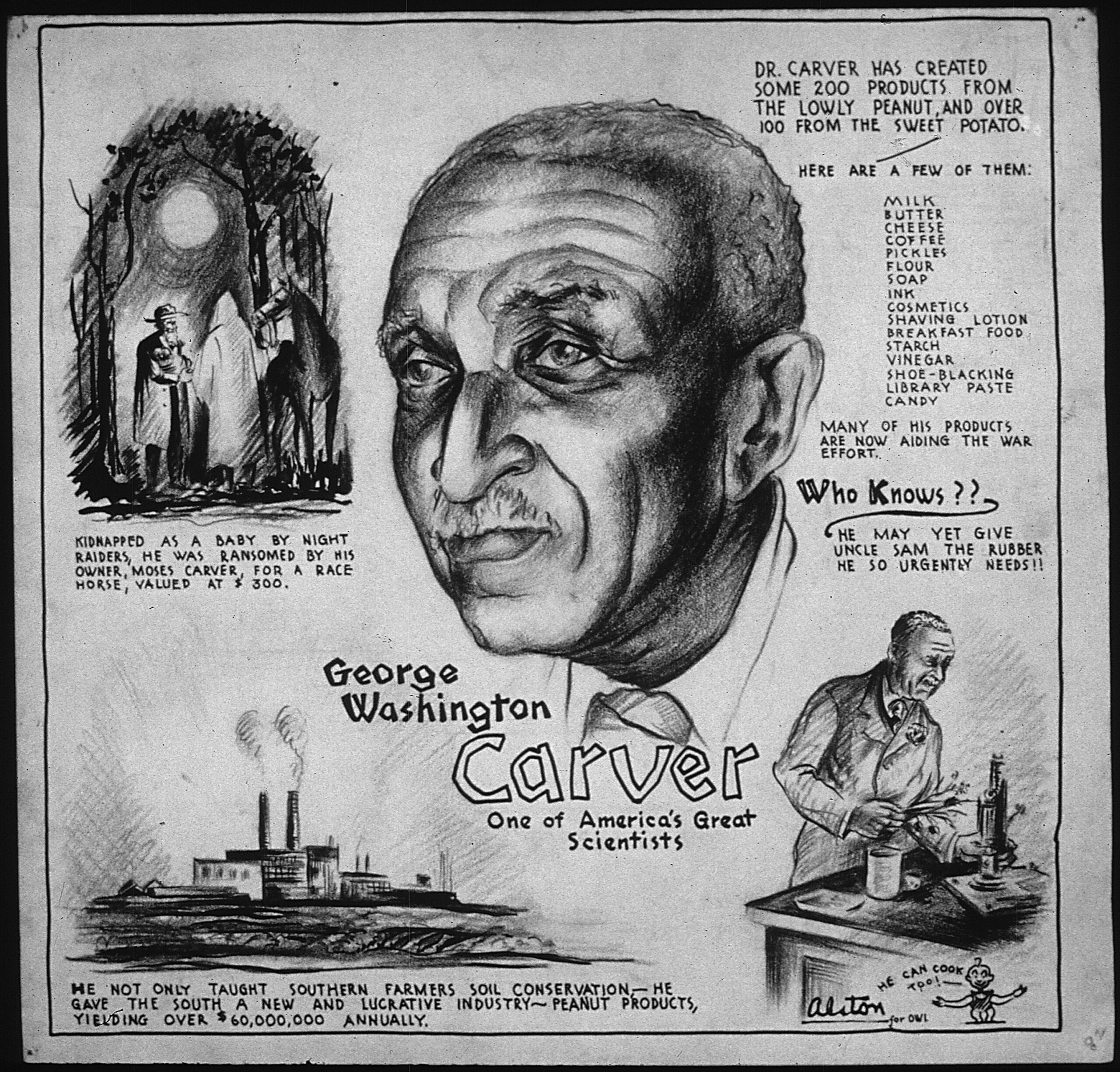
George Washington Carver (c. 1864–1943) was an American agricultural scientist, inventor, and educator who made significant contributions to agriculture and science, particularly in the Southern United States, during the late 19th and early 20th centuries. He was born into slavery in Diamond, Missouri, around 1864, although the exact date is uncertain. After slavery was abolished, he pursued education against considerable odds. Carver overcame significant challenges to become one of the most prominent African American scientists and inventors of his time.
Education and Research
Carver attended several colleges, including Simpson College and Iowa State Agricultural College (now Iowa State University), where he earned a master’s degree in botany. In 1896, Carver was invited by Booker T. Washington to lead the agricultural department at the Tuskegee Normal and Industrial Institute (now Tuskegee University) in Alabama. There, he spent the rest of his career conducting research, teaching, and promoting agricultural advancements.
Carver’s research focused on crop diversification and soil conservation, particularly in the Southern states, which were heavily reliant on cotton farming and facing soil depletion. One of his most significant contributions was his development of innovative uses for everyday crops. He advocated for crop rotation and the cultivation of leguminous crops like peanuts, soybeans, and sweet potatoes to improve soil fertility and provide alternative sources of income for farmers. He created hundreds of products from these crops, including food items, cosmetics, dyes, and industrial materials. Carver’s research helped create new markets for agricultural products and contributed to economic development in the South.

Agricultural Innovation
George Washington Carver’s contributions earned him widespread recognition and accolades during his lifetime. He became a symbol of achievement for African Americans and an inspiration to many aspiring scientists and inventors.
George Washington Carver’s work innovating everyday crops and agriculture was highly significant for several reasons:
- Promotion of Peanuts and Crop Rotation: Carver advocated for crop rotation as a means to combat soil depletion, particularly in the Southern United States where cotton monoculture had led to nutrient depletion in the soil. He recognized the value of leguminous crops like peanuts, soybeans, and sweet potatoes in replenishing soil nitrogen, thereby improving soil fertility. By promoting the cultivation of peanuts, Carver helped farmers diversify their crops, reducing their dependence on cotton and improving soil health.
- Development of New Uses for Peanuts and Other Crops: Carver conducted extensive research on peanuts, among other crops. He developed hundreds of innovative uses for these crops, including food products, dyes, paints, cosmetics, and industrial materials. Carver’s research and inventions helped create new markets for agricultural products, boosting the economy of the Southern states.
- Advancement of Agricultural Science: Carver’s work contributed to the advancement of agricultural science and technology. He conducted experiments to improve crop yields, develop disease-resistant varieties, and optimize farming practices. Carver’s research laid the groundwork for future agricultural innovations and sustainable farming techniques.
- Education and Outreach: Carver was a dedicated educator who believed in the power of knowledge to uplift individuals and communities. He taught at Tuskegee Institute (now Tuskegee University) for nearly five decades, where he mentored generations of students and farmers. Carver also conducted agricultural extension work, traveling to rural communities to share his expertise and promote scientific farming methods.
- Inspiration and Legacy: Carver’s life and achievements continue to inspire people around the world. He overcame numerous obstacles, including poverty and racial discrimination, to become one of the most respected scientists of his time. Carver’s legacy lives on through his contributions to agriculture, his commitment to education, and his dedication to improving the lives of others.
His contributions to American agriculture were multifaceted and far-reaching, impacting farming practices, economic development, and scientific research for generations to come. He remains an iconic figure in the history of agriculture and a symbol of perseverance, innovation, and service to humanity.
Dedication to Education and Life’s Work
Throughout his life, Carver was also a dedicated educator and advocate for education. He taught at Tuskegee Institute for nearly five decades, mentoring generations of students and farmers. Carver believed in the power of education to uplift individuals and communities, particularly African Americans in the segregated South. His achievements earned him widespread recognition and accolades during his lifetime, including honorary degrees, awards, and invitations to advise world leaders. He became one of the most respected scientists and educators of his time, and his legacy continues to inspire people around the world. Carver passed away on January 5, 1943, leaving behind a lasting impact on agriculture, education, and social progress. Today, he is remembered as a trailblazer in agricultural science and a significant figure in American history.
Active Classroom has hundreds of activities to explore more African American biographies
Try a free 30-day trial today
Monet Hendricks is the blog editor and social media/meme connoisseur for Social Studies School Service. Passionate about the field of education, she earned her BA from the University of Southern California before deciding to go back to get her Master’s degree in Educational Psychology. She attended the graduate program at Azusa Pacific University pursuing her post-grad Educational Specialist degree in School Psychology and Applied Behavior Analysis and currently works as a School Psychologist in Los Angeles, CA. Her favorite activities include traveling, watching documentaries on mental health, and cooking adventurous vegetarian recipes with her husband.
